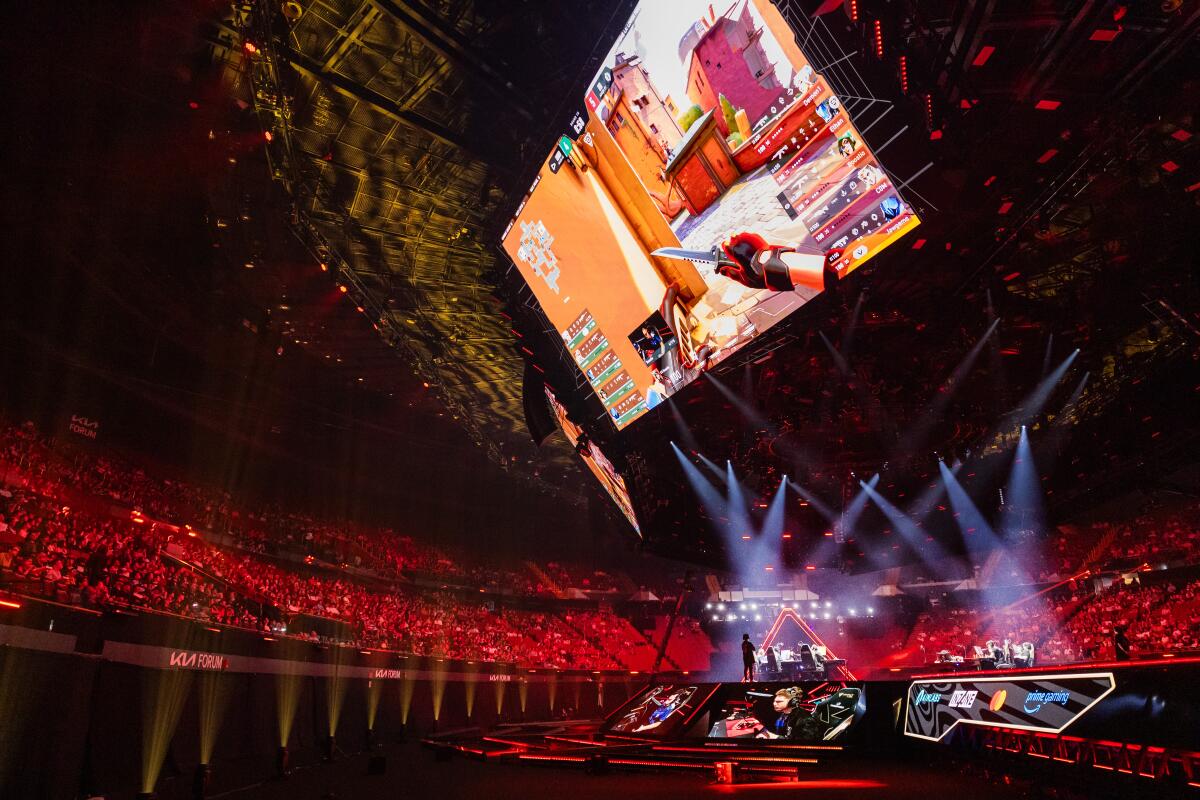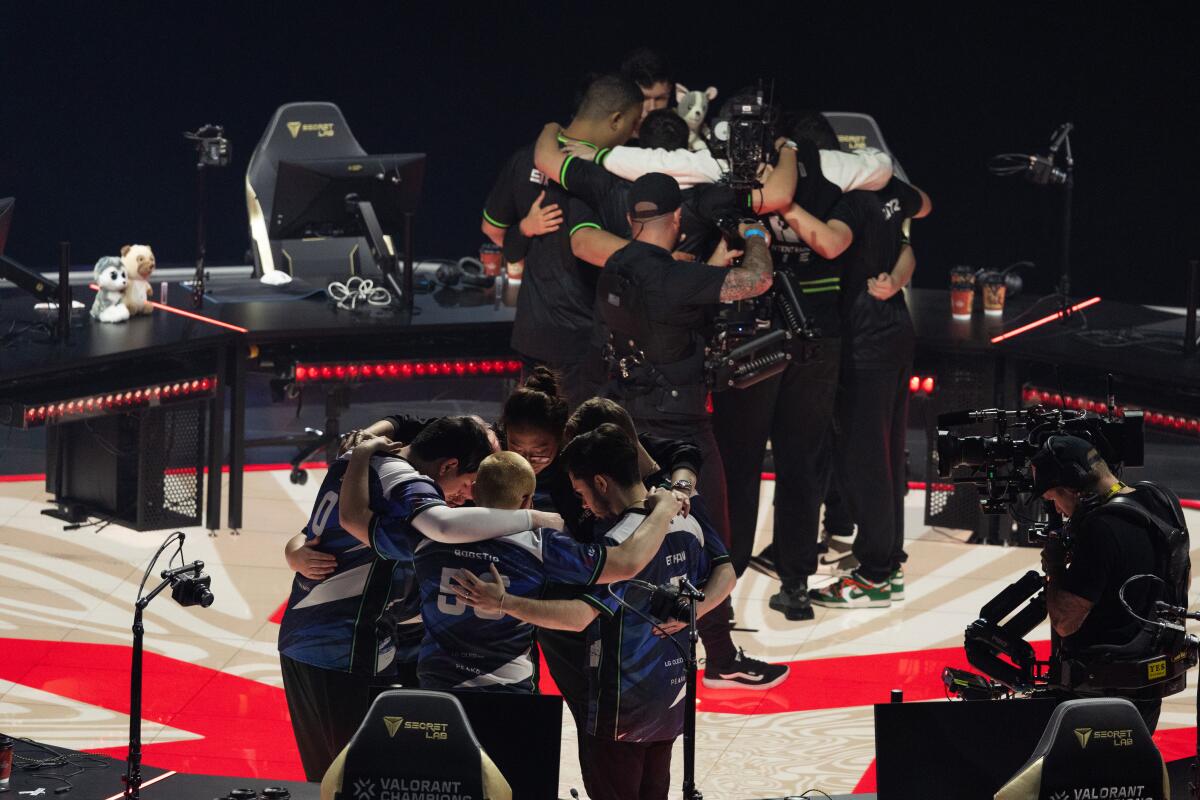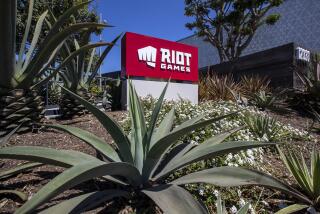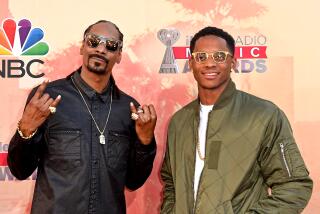Forget Harry Styles. Riot Games is one of L.A.’s biggest stars headlining the Kia Forum

The roar of cheering fans echoed across the Kia Forum on Saturday as singers took the stage beneath glimmering lights and flashes of flame to perform a dramatic opening act.
But the thousands gathered in Inglewood over the weekend weren’t screaming for Sam Smith or Harry Styles — they were cheering for professional esports players.
The Valorant Champions Tour grand final, which drew 11,500 people, was hosted by Los Angeles-based video game giant Riot Games.
A first-person shooter game launched in 2020, “Valorant” is a core Riot title and key to the company’s strategy to continue its growth as a dominant esports presence. In the free-to-play game, teams of five face off and play agents with unique abilities.
The global games market will generate $187.7 billion in 2023, up nearly 3 % from last year, a new report from Newzoo projects.
Such in-person events are part of Riot’s long-term investment strategy in esports, which has soared in popularity: Tickets for Saturday’s grand final sold out in two minutes. The event boasted a $2.25-million prize pool, with $1 million of that reserved for the first-place team.
By leveraging “Valorant’s” popularity alongside a tournament, Riot Games aims to drive sales of in-game items as well as grow revenue from sponsors while keeping players engaged in fandom.
The game developer — which spun an Emmy-winning animated series called “Arcane” out of its hugely popular multiplayer online battle arena game “League of Legends” — sees only opportunity in esports.
“The concept of professional, high quality, Big 10 esports was something we feel like we’ve helped spearhead,” said Whalen Rozelle, chief operating officer of Riot Games Esports. “We’re really trying to find our niche and landing between these three spots: the storytelling of Hollywood, the drama of sports and the really connected communal nature of games.”
Riot invested in not only “the supporting infrastructure” of esports, he said, but also in broadcast quality and in hiring people with diverse backgrounds in gaming, esports and sports.
The global esports audience was projected to grow nearly 9% last year to reach 532 million, according to a 2022 report from industry tracker Newzoo. Analysts expect the total audience will surpass 640 million by 2025.
Riot has been a pivotal player in the development of the esports industry through events like the League of Legends Championship Series, said Brett Abarbanel, executive director of the International Gaming Institute at the University of Nevada, Las Vegas .
As the actors’ strike continues, voice actors hope for their own contract requiring consent and compensation for AI to reproduce their voice or likeness.
“When it comes to this broader esports and spectatorship of competitive games,” she said, “Riot has really been a major driver of both for their own games as well as the communities that play and watch those games.”
For Meg Cabras, the community around “Valorant” is a big part of the draw of not just playing but also attending the Valorant Champions Tour. The 22-year-old flew to L.A. from Florida and met with her friends to watch three days of competition at the Forum (she paid $85), as well as join “Fan Fest” and other events.
“I think people use it as a source of creativity and a way to bond with each other,” she said, adding that she loves the aesthetics of “Valorant” and that the characters are culturally diverse.
Cabras, who is Filipino, said she felt represented by one of the agents in particular: Neon, a blue- and yellow-haired duelist from the Philippines.
Cabras started watching the championship after she started playing the game about two years ago, tuning in to nearly every match. When Riot announced that this year’s tour would be in L.A., she knew she had to be there.
“Hearing the crowd cheer every time something happens or goes wrong, it is not the same as being at home,” Cabras said. “Everyone was so hype.”
“We’re really trying to find our niche and landing between these three spots: the storytelling of Hollywood, the drama of sports and the really connected communal nature of games.”
— Whalen Rozelle, COO of Riot Games Esports
Riot’s founders — USC alumni Marc Merrill and Brandon Beck — admired games with esports like “Starcraft” and “Counter Strike,” said John Needham, president of esports at Riot. They hoped “League of Legends” would one day merit an esport of its own, while making playing on a team a well-paying career.
“It was back in 2011 that we had our first Worlds...and they were very surprised when a million people tuned in to watch,” he said, referring to the world championship for “League of Legends.” “They were like, ‘OK, well, this is something that we should probably invest in. It seems to be popular for players. And it’s a way for them to engage in the game when they’re not actually playing the game.’”
In-game digital content is popular with players because they see it as a way to contribute to the esport and their teams, Needham added. Proceeds from this year’s VCT champions collection — a bundle of in-game items for sale — will finance more than $20 million paid to partner teams around the world, he said.
Riot shares 50% of the net proceeds from the Championship bundle with participating VCT teams.
“Sponsorships are a big part of our business right now. And that is the primary source of revenue for us,” Needham added.
Although Riot’s esports aren’t profitable yet, he said Riot will continue to invest in that space.
“We’re close with ‘League of Legends,’” he said. “We’re just getting started with ‘Valorant’... But we believe that we will get to sustainability in around five years.”
Total sales for last year’s champions bundle reached $42 million, with half going to the teams, according to Riot. Sales could be as much as 20% higher this year.
Riot pays pro teams a fixed annual stipend, a percentage of digital sales for esports content and offers prize pools for game participants.
The West L.A. game developer, which employs about 4,500 globally, has quietly grown into one of the region’s largest office tenants at nearly 1 million square feet, with more on the way as the video game industry continues to evolve into a major economic player in Southern California.
The Valorant Champions Tour marked a homecoming celebration for the teams that launched “Valorant” — or “Val,” as fans call it — during the pandemic. It was also a chance for Riot to host a tournament in its own backyard and mingle with many of its 28 million global players.
Riot hosted early rounds of the tournament at the Shrine Auditorium, where 16 teams battled in four groups of four before winners advanced. The top four teams then competed at the Forum, the largest-capacity venue in the history of VCT Champions.
A team called Evil Geniuses defeated Paper Rex in the best-of-five Champions grand final. Among the fans in attendance were Ben Affleck and Elon Musk, Riot said.
Riot views esports as part of the game business, rather than as a sports enterprise per se.

Rozelle, the chief operating officer, said the esports team is learning about which games could be marquee esports and which titles won’t fit the mold. For example, “Teamfight Tactics,” a “League of Legends” spin-off strategy game, isn’t the most successful esport, despite its popularity as a game.
“People play it for different reasons,” he said. “So giving them a high-fidelity broadcast spectacle event is not actually the core loop that they’re looking for.”
For a game like that, Rozelle said, Riot is looking to expand participation by modeling events that more closely mimic a sport like the World Series of Poker.
In December, Riot plans on hosting the first TFT Vegas Open at the MGM Grand Conference Center in Las Vegas, bringing 512 players from around the world to compete for prizes. The winner will take home $100,000.
“You’re gonna see esports sort of pushing the boundaries of what this new form of entertainment is going to look like,” Rozelle said.
Riot’s teams brainstormed Valorant’s esport element well in advance of the title’s release, he said.
Anna Donlon, executive producer of “Valorant,” worked with Rozelle on “League of Legends” before being brought on for the first-person shooter. Rozelle had been tasked with thinking about what an esport for “Valorant” would look like. The pair wanted to take the lessons they learned from “League of Legends” and apply them to the new game.
The main complication, however, was releasing the game in June 2020, just a few months after the pandemic began.
“It was a great time to launch a game because people were at home, but people needed something new to entertain themselves,” Donlon said as teams battled at the Forum on Friday. “But then imagine thinking, ‘OK, cool. We probably could use an esport.’ Well, guess what? There’s no live events... How do we start to build something?”
The esports team found a way to start a professional tournament system from locations in players’ homes. As pandemic restrictions started to lift, “we went right up to the limit of what we could do every single year,” Donlon said.
Sitting in a massive arena in L.A. and watching thousands of people cheer on “Valorant” teams at the Forum — a venue where Donlon has seen more than 20 shows — felt especially meaningful to her as a native Angeleno, she said.
There’s a wall behind the stage where every artist or show that comes through places their name, she said. Last week, Valorant Champions was added to that tapestry.
More to Read
Inside the business of entertainment
The Wide Shot brings you news, analysis and insights on everything from streaming wars to production — and what it all means for the future.
You may occasionally receive promotional content from the Los Angeles Times.













